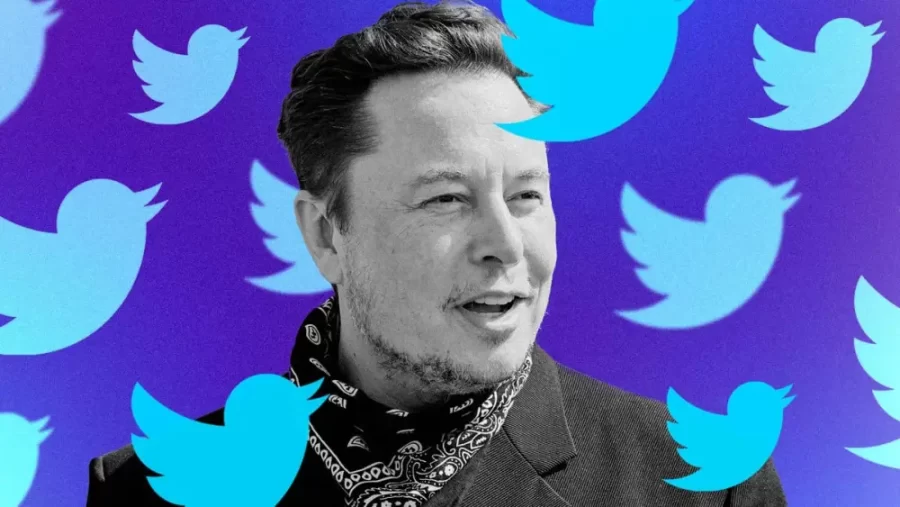Billionaire or “Faillionaire?”; Elon Musk’s rather controversial takeover of Twitter, Inc.
When Elon Musk had purchased Twitter on the 28th, he tweeted “the bird is freed”. Photo via Clout News.
December 1, 2022
On Oct. 28, a rather intriguing event occurred, namely that billionaire Elon Musk finally bit the bullet and purchased Twitter Inc. for a hefty sum of $44 billion. After equity, debt financing, closing and other miscellaneous costs, the total financial dent came to approximately $46.5 billion. Hilariously enough, the day the closing began, Elon Musk decided to walk straight into Twitter’s headquarters with a detached kitchen sink, while tweeting.
Plans to acquire the company began in April, followed by multiple attempts to cancel the negotiations in July (in addition to some legal challenges by Twitter shareholders and executives), with a final closing of the deal just this month.
Musk’s first business decision as the new man in charge was to take the company private by firing the company’s top executives and laying off thousands of employees. This essentially became one of the most confusing and concerning events in Twitter’s history.
As for Twitter employees, the way Musk decided whether to boot them was by one metric and one metric alone: simply the number of lines of code they had written in the past 30 to 60 days. This decision gave Twitter’s developers and engineers a notable edge over other, less technical positions such as sales and customer service.
The decision was not based upon any other factor whatsoever, resulting in several key departments being removed from the company in a matter of days or less. One such example ended up being the communications department, according to multiple sources and organizations who attempted to contact the company during all of the harassment.
Additionally, the coveted blue checkmark system has changed as well. The previous system required specific requirements, such as a level of influence and activity, among others. However, the new system was rolled out just a week or so ago, promising to “give power to the people” (according to Musk) by allowing for the shiny blue badge to be purchased for simply $8 a month.
Almost immediately, several impersonation accounts, trolls, and other harassment entities took form, as massive companies like Nintendo, Nestle, Lockheed Martin (an aerospace company that sells a lot of technology to the U.S. military) and Eli Lilly & Co. (a pharmaceutical company that derives most of its profit from selling insulin) began losing billions of dollars as their stocks plummeted among the chaos caused by the impersonators.
Meanwhile, at Twitter Headquarters, Musk struggled to bring back some of the crucial people keeping Twitter running. Several privileges, such as mental health days and other benefits, were retracted or cut as the company continued to transform. In fact, as recent as just a few days ago at the time of writing, an ultimatum was just released that allows the remaining employees of Twitter to essentially choose to either leave or become part of what Elon Musk called “the new Twitter 2.0”, featuring much more aggressive cuts and other changes such as more intense work hours, cuts or removal of certain benefits such as paid time off, an order for the workforce to return to the office, and many more generally unpopular changes.
To pivot towards whether privacy and security will be properly handled at the newly transformed Twitter, the privacy practices of Elon Musk and his companies have not been regarded as respectable, according to GNU and the Free Software Foundation. For instance, Tesla, Inc., another company headed by Elon Musk, has repeatedly been found to violate user privacy in a multitude of ways by installing measures such as backdoors and tracking devices into their vehicles as early as 2013.
From what I have been able to observe, almost everyone (from big-time media to good friends of mine) agrees that the dumpster fire of present-day Twitter is certainly a massive problem. From tracking and data security practices under Musk to blue checkmark drama and censorship of impersonators, to even general handling of the company and so much more, many people (including myself) have jumped ship and ditched the platform, at least for the foreseeable future.
Former Twitter CEO, Jack Dorsey, commented on Musk’s potential takeover (at the time), saying, “I don’t believe any individual or institution should own social media, or more generally media companies. It should be an open and verifiable protocol. Everything is a step toward that.”



